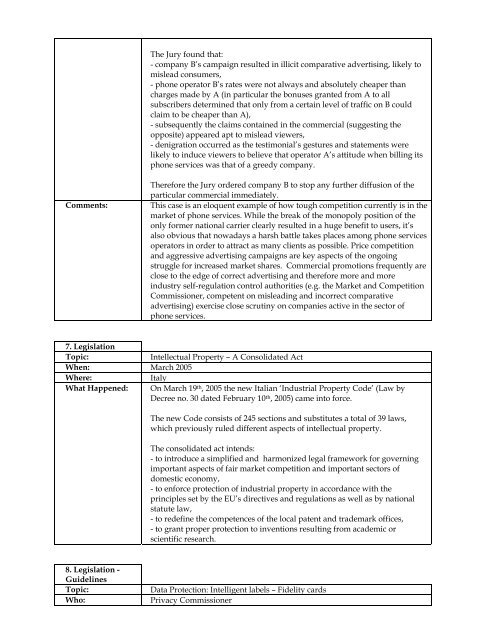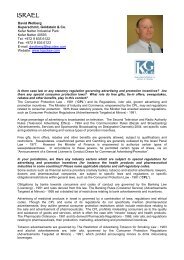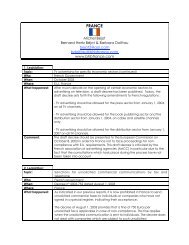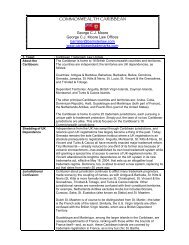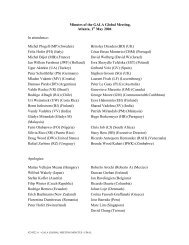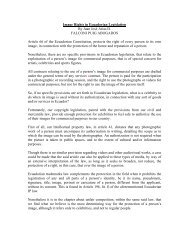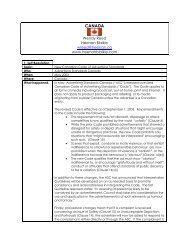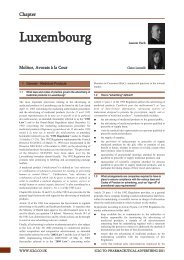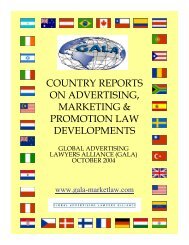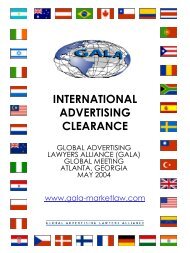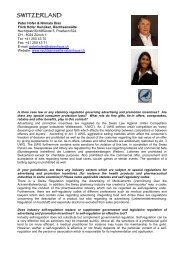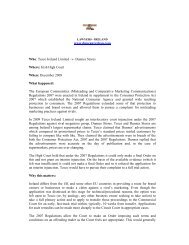list of contributors - GALA
list of contributors - GALA
list of contributors - GALA
You also want an ePaper? Increase the reach of your titles
YUMPU automatically turns print PDFs into web optimized ePapers that Google loves.
The Jury found that:<br />
- company B’s campaign resulted in illicit comparative advertising, likely to<br />
mislead consumers,<br />
- phone operator B’s rates were not always and absolutely cheaper than<br />
charges made by A (in particular the bonuses granted from A to all<br />
subscribers determined that only from a certain level <strong>of</strong> traffic on B could<br />
claim to be cheaper than A),<br />
- subsequently the claims contained in the commercial (suggesting the<br />
opposite) appeared apt to mislead viewers,<br />
- denigration occurred as the testimonial’s gestures and statements were<br />
likely to induce viewers to believe that operator A’s attitude when billing its<br />
phone services was that <strong>of</strong> a greedy company.<br />
Therefore the Jury ordered company B to stop any further diffusion <strong>of</strong> the<br />
particular commercial immediately.<br />
Comments: This case is an eloquent example <strong>of</strong> how tough competition currently is in the<br />
market <strong>of</strong> phone services. While the break <strong>of</strong> the monopoly position <strong>of</strong> the<br />
only former national carrier clearly resulted in a huge benefit to users, it’s<br />
also obvious that nowadays a harsh battle takes places among phone services<br />
operators in order to attract as many clients as possible. Price competition<br />
and aggressive advertising campaigns are key aspects <strong>of</strong> the ongoing<br />
struggle for increased market shares. Commercial promotions frequently are<br />
close to the edge <strong>of</strong> correct advertising and therefore more and more<br />
industry self-regulation control authorities (e.g. the Market and Competition<br />
Commissioner, competent on misleading and incorrect comparative<br />
advertising) exercise close scrutiny on companies active in the sector <strong>of</strong><br />
phone services.<br />
7. Legislation<br />
Topic: Intellectual Property – A Consolidated Act<br />
When: March 2005<br />
Where: Italy<br />
What Happened: On March 19 th , 2005 the new Italian ‘Industrial Property Code’ (Law by<br />
Decree no. 30 dated February 10 th , 2005) came into force.<br />
The new Code consists <strong>of</strong> 245 sections and substitutes a total <strong>of</strong> 39 laws,<br />
which previously ruled different aspects <strong>of</strong> intellectual property.<br />
The consolidated act intends:<br />
- to introduce a simplified and harmonized legal framework for governing<br />
important aspects <strong>of</strong> fair market competition and important sectors <strong>of</strong><br />
domestic economy,<br />
- to enforce protection <strong>of</strong> industrial property in accordance with the<br />
principles set by the EU’s directives and regulations as well as by national<br />
statute law,<br />
- to redefine the competences <strong>of</strong> the local patent and trademark <strong>of</strong>fices,<br />
- to grant proper protection to inventions resulting from academic or<br />
scientific research.<br />
8. Legislation -<br />
Guidelines<br />
Topic: Data Protection: Intelligent labels – Fidelity cards<br />
Who: Privacy Commissioner


